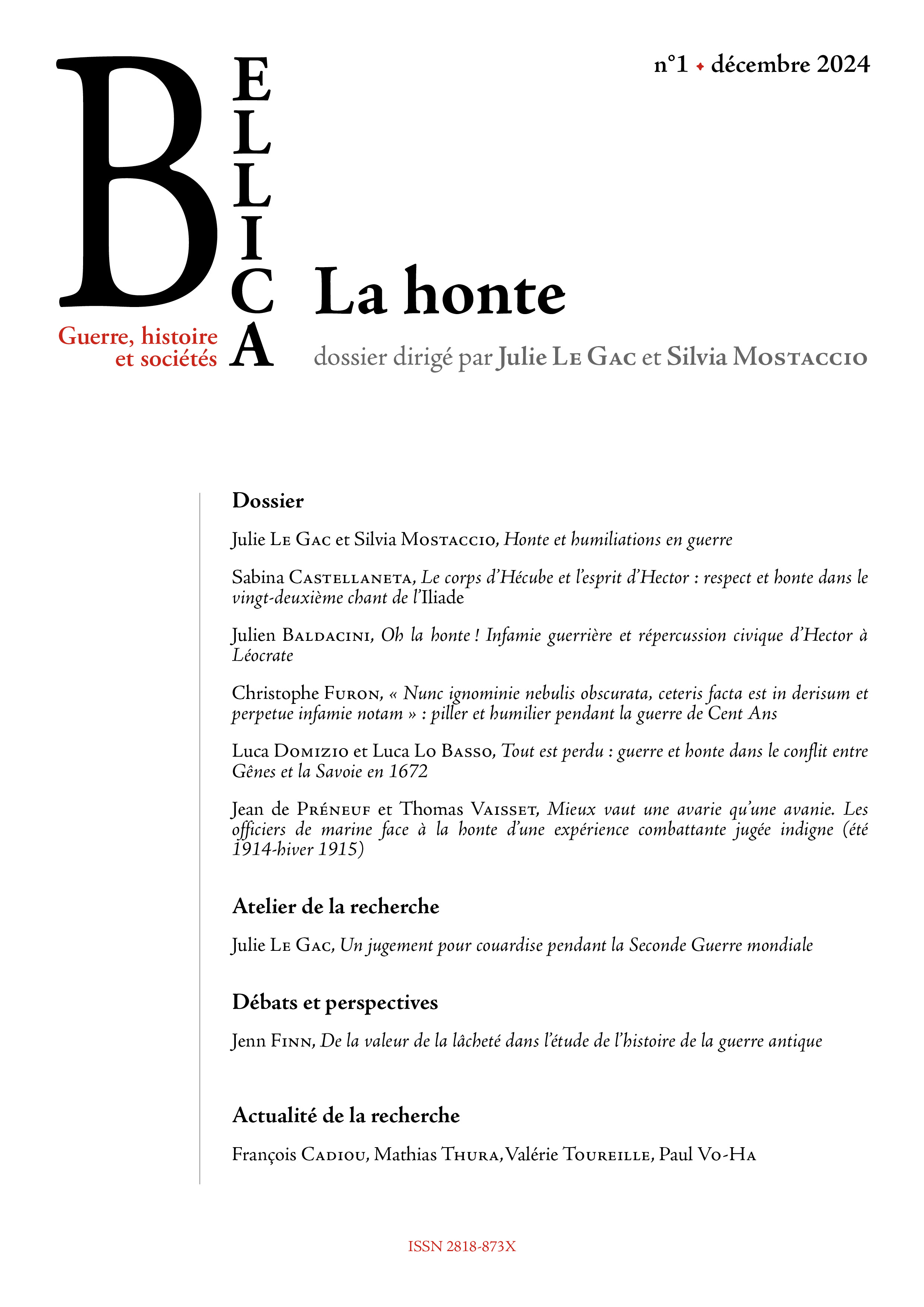Mieux vaut une avarie qu’une avanie. Les officiers de marine face à la honte d’une expérience combattante jugée indigne (été 1914-hiver 1915)
DOI :
https://doi.org/10.70958/bellica.v1i1.2728Mots-clés :
Première Guerre mondiale, World War I, guerre sur mer, Naval warfare, expérience combattante, combat experience, histoire des sensibilités et des émotions, history of sensibilites and emotionsRésumé
En août 1914, les officiers de marine français, baignés dans une mystique de l’offensive exaltant le courage viril face au feu adverse, entrent dans la guerre avec l’horizon d’attente d’une bataille décisive qui serait livrée escadre contre escadre. Mais l’ennemi se dérobe et refuse l’affrontement. Ces conditions opérationnelles déstabilisantes des premiers mois de guerre sont à l’origine, chez les officiers, d’un sentiment de honte dont les manifestations et les ressorts se saisissent dans leurs correspondances privées. Ces marins sont en effet convaincus d’être privés de l’opportunité de vivre une expérience combattante conforme à un système de valeurs participant d’une éthique chevaleresque, héroïque et viriliste alors que la réalité quotidienne des opérations invite à nuancer le topos de l’inaction de l’Armée navale. Cet article questionne l’expérience sensible de la honte au sein d’une catégorie singulière et peu connue des combattants des débuts de la Grande Guerre et étudie la manière dont ces hommes s’efforcent de s’en accommoder et de la dépasser. Cela passe par des attitudes visant à rester en phase avec le système traditionnel de valeurs, des tentatives pour réagencer le code de l’honneur des officiers et leur éthos combattant dans une écriture de soi valorisant de nouvelles pratiques martiales liées à la guerre d’usure qui s’impose en mer.
In August 1914, French naval officers, steeped in a mystique of the offensive based on the exaltation of virile courage in the face of enemy fire, entered the war with the expectation of a decisive battle to be fought fleet against fleet. But the enemy evaded them and refused to engage. These very destabilizing operational conditions in the early months of the war gave rise among officers to a sense of shame whose manifestations and underlying causes can be grasped in their private correspondence. These sailors were indeed convinced of being deprived of the opportunity to experience combat according to a system of values that partook of a chivalric, heroic, and virile ethic, even as the daily reality of operations invited a nuanced view of the perceived inaction of the naval forces. This article aims to question the sensitive experience of shame within a singular and little-known category of combatants in the early days of the Great War, and then to study how these men sought to come to terms with it and overcome it. This involved attitudes aimed at remaining in harmony with the traditional value system. But also attempts to rearrange the code of honor specific to officers and to redefine the combat ethos in self-writing by valorizing new warfare practices linked to the grinding war that was imposed at sea.
Téléchargements
Publié-e
Comment citer
Numéro
Rubrique
Licence

Cette œuvre est sous licence Creative Commons Attribution - Pas d'Utilisation Commerciale 4.0 International.
Le texte seul est utilisable sous licence Creative Commons - Attribution - Pas d’utilisation Commerciale - CC BYNC. Les autres éléments (illustrations, fichiers annexes importés) sont Tous droits réservés, sauf mention contraire.


